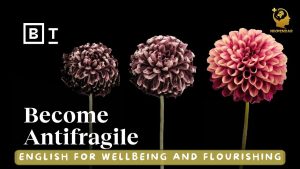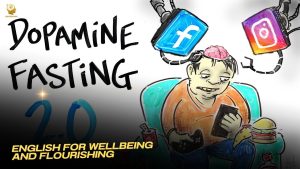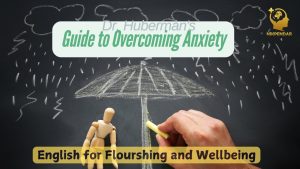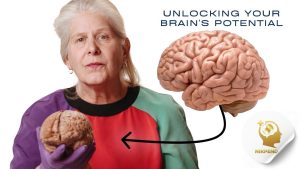
Beginner
Task 1: Share Your Experience with Stress
Instructions: Listen to the beginning of the talk. The speaker asks about stress. Think about your own life.
Questions:
-
- Do you sometimes feel stress? (Yes/No)
- What makes you feel stressed? (e.g., school, work, traffic)
- When you feel stressed, what happens to your body? (e.g., fast heart, fast breathing)
- What do you do when you feel stressed? (e.g., relax, listen to music)
Example Phrases to Use:
-
- “I feel stressed when…”
- “My heart beats fast.”
- “I try to relax.”
Task 2: Agree or Disagree
Instructions: The speaker talks about how we think about stress. Do you agree or disagree with these statements?
Statements:
-
- “Stress makes you sick.” (Agree/Disagree)
- “Thinking stress is bad for you is actually bad for you.” (Agree/Disagree)
Example Phrases to Use:
-
- “I agree because…”
- “I disagree because…”
- “I think…”
Intermediate
Task 1: Summarize the Main Idea
Instructions: The speaker talks about a big change in how she thinks about stress. What is her main new idea about stress?
Questions:
-
- What did the speaker used to tell people about stress?
- What did she learn from the study about 30,000 adults?
- What is her new mission regarding stress?
Key Vocabulary to Use:
-
- “harmful”
- “mindset” or “belief”
- “healthier”
- “resilience”
Task 2: Describe the “Social Stress Test”
Instructions: The speaker describes a study designed to stress people out. Explain what happens in this “social stress test.”
Questions:
-
- What do participants have to do in the first part?
- What makes this part stressful?
- What happens in the second part (the math test)?
- How did some participants change their reaction to the stress?
Key Vocabulary to Use:
-
- “impromptu speech”
- “evaluators”
- “harass”
- “physical response”
- “energized”
Task 3: Discuss Oxytocin and Social Connection
Instructions: The speaker talks about a hormone called oxytocin and its connection to stress and social support. Explain how oxytocin helps us.
Questions:
-
- What is oxytocin often called?
- How is it related to the stress response?
- What does oxytocin make us want to do when we’re stressed?
- How does helping others under stress affect our health?
Key Vocabulary to Use:
-
- “cuddle hormone”
- “neuro-hormone”
- “seek support”
- “resilience”
- “human connection”
Advanced
Task 1: Analyze the Speaker’s Confession and Evolution
Instructions: The speaker begins with a confession. Analyze her evolution in understanding stress and the impact of her previous teachings versus her current insights.
Questions:
-
- What was the speaker’s initial confession, and why was it significant given her profession?
- How did the 30,000-adult study fundamentally change her perspective? Discuss the key finding and its implications.
- In what ways has her mission as a health psychologist changed, and what does she now aim to achieve?
- Consider using these concepts:
- Cognitive reappraisal
- Physiological response
- Causality vs. correlation
- Public health implications
Task 2: Evaluate the “Biology of Courage” and Oxytocin’s Role
Instructions: Explain the “biology of courage” as presented by the speaker and elaborate on how oxytocin contributes to a healthier stress response and resilience.
Questions:
-
- Describe the typical physiological stress response versus the “healthier cardiovascular profile” when stress is viewed as helpful. What are the long-term health implications of this difference?
- Beyond its “cuddle hormone” reputation, what are the broader functions of oxytocin, particularly as a stress hormone?
- How do social contact and support enhance the physical benefits of oxytocin during stressful times?
Consider using these concepts:
-
- Sympathetic nervous system
- Cardiovascular health
- Neuro-hormonal mechanisms
- Anti-inflammatory properties
- Homeostasis
Task 3: Reflect on the Practical Application of the Research
Instructions: Discuss how the insights from this talk can be applied to real-life decisions and challenges, specifically addressing Chris Anderson’s question about choosing between a stressful and non-stressful job.
Questions:
-
- Based on the research, what is the most profound statement one makes by viewing stress positively?
- How does the final study (tracking 1,000 adults) reinforce the idea that stress’s harmful effects are not inevitable?
- How would you advise someone facing a choice between a stressful and a non-stressful job, incorporating the speaker’s final advice?
Consider using these concepts:
-
- Meaning-seeking
- Self-efficacy
- Proactive coping
- Community resilience
- Paradigm shift
Beginner
Task 1: Listen for Key Words
Listen to the first minute of the transcript. Circle the words you hear.
- stress
- sick
- health
- enemy
- mind
- study
Task 2: True or False (First 2 minutes)
Listen to the first two minutes of the transcript. Mark the following statements as True (T) or False (F).
- The speaker is a health psychologist. (T/F)
- She has been telling people stress is good for them. (T/F)
- A study tracked 30,000 adults. (T/F)
- People who believed stress was harmful had a lower risk of dying. (T/F)
- Believing stress is bad for you caused more deaths than skin cancer. (T/F)
Task 3: Simple Fill-in-the-Blanks (First 3 minutes)
Listen to the first three minutes and fill in the missing words.
- My mission is to help people be happier and __________.
- For years I’ve been telling people, stress makes you __________.
- This study tracked __________ adults in the United States.
- People who experienced a lot of stress had a __________ percent increased risk of dying.
- Changing how you think about stress can make you __________.
Intermediate
Task 1: Main Idea Identification
Listen to the entire transcript. What is the speaker’s main confession or realization about stress? A) Stress always makes you sick. B) Stress is the 15th largest cause of death. C) Her previous teaching about stress might have been harmful, and she believes changing your mindset about stress can be beneficial. D) You should try to avoid all stressful situations.
Task 2: Comprehension Questions (Detailed)
Listen to the first half of the transcript (up to the end of the “social stress test” description). Answer the following questions:
- What did the speaker initially teach people about stress for 10 years?
- What two main questions were asked in the study that tracked 30,000 adults?
- What was the surprising finding about people who experienced a lot of stress but did not believe it was harmful?
- Describe the “social stress test” experiment. What two main parts did it involve?
- According to the Harvard study, how did participants who viewed their stress response as helpful perform differently physically?
Task 3: Summarizing Key Concepts
Listen to the second half of the transcript (from the discussion of oxytocin to the end). Briefly explain the role of oxytocin in the stress response and how helping others can affect stress resilience.
Advanced
Task 1: Critical Analysis and Opinion
Listen to the entire transcript.
- The speaker states that “believing stress is bad for you” is the 15th largest cause of death in the U.S. last year. Discuss the implications of this statement. Do you find this claim convincing? Why or why not?
- The speaker advocates for changing your mindset about stress to make it an ally rather than an enemy. Do you think this is a realistic approach for everyone? What might be some challenges people face in adopting this mindset?
Task 2: Explaining Nuances
Listen to the sections discussing the physiological changes during stress (heart rate, blood vessels) and the role of oxytocin.
- Explain the difference in cardiovascular response between a typical stress reaction and when participants viewed their stress response as helpful. Why is the latter considered healthier?
- Beyond its “cuddle hormone” nickname, how does oxytocin contribute to the stress response and offer biological benefits, particularly to the cardiovascular system?
Task 3: Extended Discussion
At the end of the talk, Chris Anderson asks Kelly McGonigal about lifestyle choices between stressful and non-stressful jobs. How does Kelly McGonigal advise making such decisions, and what is her core message regarding meaning versus avoiding discomfort? Relate this back to the overall theme of her talk.
Beginner
Task 1: Main Idea Match
Read the following sentences. Which sentence best describes the main idea of the speaker’s confession about stress?
- Stress always makes you sick.
- Thinking about stress differently can make you healthier.
- Everyone experiences a lot of stress.
Task 2: True or False
Read the sentences below. Based on the transcript, write True or False next to each one.
- The speaker used to tell people that stress was good for them.
- A study found that believing stress is bad for you can be harmful.
- Your heart beats faster when you are stressed.
- Oxytocin is a stress hormone.
- Helping others under stress makes you less healthy.
Task 3: Find the Words
Find the following words in the text and write down the sentence they are in:
- confession
- harmful
- healthier
- rethink
Intermediate
Task 1: Summarize the Study
In your own words, briefly explain the main findings of the study that made the speaker “rethink” her approach to stress. What did the study discover about stress and death?
Task 2: Understanding Key Concepts
Explain the following concepts as described in the transcript:
- “Biology of courage”: What does this mean in the context of the speaker’s message?
- Oxytocin’s role in stress: How does this hormone help us deal with stress, according to the speaker?
Task 3: Cause and Effect
Based on the text, identify the cause and effect relationships:
- Cause: Believing stress is bad for your health. Effect: __________________________________________________
-
Cause: Viewing your stress response as helpful. Effect: __________________________________________________
-
Cause: Reaching out to others under stress (seeking or giving support). Effect: __________________________________________________
Advanced
Task 1: Critical Analysis
The speaker argues that “how you think about stress matters.” Discuss the evidence she provides to support this claim, referencing both the 30,000-adult study and the Harvard University “social stress test” study. How do these studies contribute to her argument?
Task 2: The Paradox of Stress
The speaker initially “demonized stress” but now wants to “make you better at stress.” Analyze this shift in perspective. What specific mechanisms (both psychological and biological) does she explain that transform the negative effects of stress into beneficial outcomes?
Task 3: Real-World Application and Debate
Chris Anderson asks about lifestyle choices between a stressful and non-stressful job. How does the speaker’s advice (“chasing meaning is better for your health than trying to avoid discomfort”) align with or challenge traditional views on stress management? Discuss the implications of her perspective for individuals making significant life decisions.
Beginner
Task 1: My Feelings About Stress
Instructions: Read the first few paragraphs of the transcript (until “I have changed my mind about stress, and today, I want to change yours.”). In 3-5 simple sentences, describe how you usually feel when you are stressed. Do you think stress is good or bad for you?
Word Count: 30-50 words
Key Vocabulary from Transcript: stress, feel, healthy, sick, enemy
Task 2: The Study’s Big Surprise
Instructions: The speaker talks about a study where people who believed stress was bad for them had a higher risk of dying. In 4-6 simple sentences, explain what surprised the speaker about this study. What did she learn about how believing stress is harmful can affect people?
Word Count: 40-60 words
Key Vocabulary from Transcript: study, surprised, believe, harmful, health, risk
Intermediate
Task 1: Rethinking Your Stress Response
Instructions: The speaker suggests that changing how you think about stress can change your body’s response. Using examples from the “social stress test” part of the transcript (e.g., pounding heart, faster breathing), explain how someone can reframe their physical stress symptoms as helpful. What are the benefits of this new perspective?
Word Count: 80-120 words
Key Vocabulary from Transcript: stress response, reframe, physical changes, pounding heart, breathing faster, confidence, cardiovascular profile
Task 2: The Power of Oxytocin
Instructions: The transcript discusses oxytocin as a “stress hormone” that makes you more social. Explain how oxytocin works within the stress response to benefit both your mind and body. How does connecting with others under stress enhance these benefits?
Word Count: 100-150 words
Key Vocabulary from Transcript: oxytocin, neuro-hormone, social instincts, empathy, cardiovascular system, anti-inflammatory, regenerate, resilience, human connection
Advanced
Task 1: Transforming Your Relationship with Stress
Instructions: The speaker’s goal shifted from getting rid of stress to making people “better at stress.” Analyze the core arguments and scientific evidence presented in the transcript that support this new approach. Discuss how both a change in mindset and engaging in social connection can transform the experience of stress and lead to improved health outcomes.
Word Count: 180-250 words
Key Vocabulary from Transcript: health psychologist, mindset, cardiovascular disease, physiological response, oxytocin, social support, resilience, premature death, biological change, profound statement
Task 2: Stress, Meaning, and Life Choices
Instructions: In the Q&A section, Chris Anderson asks about choosing between a stressful and non-stressful job. The speaker responds that “chasing meaning is better for your health than trying to avoid discomfort.” Discuss this statement in the context of the entire presentation. To what extent does the speaker’s argument suggest that embracing challenges and the stress that comes with them, rather than avoiding them, can lead to a more fulfilling and healthier life? Use specific examples and evidence from the transcript to support your analysis.
Word Count: 200-300 words
Key Vocabulary from Transcript: lifestyle choice, meaning, discomfort, life expectancy, trust yourself, challenges, cardiovascular profile, human connection, stress resilience, profound statement





